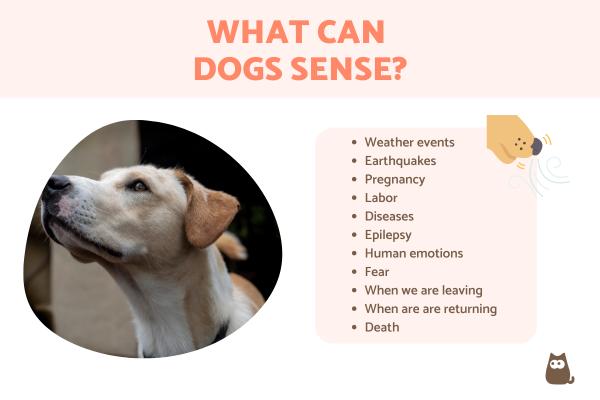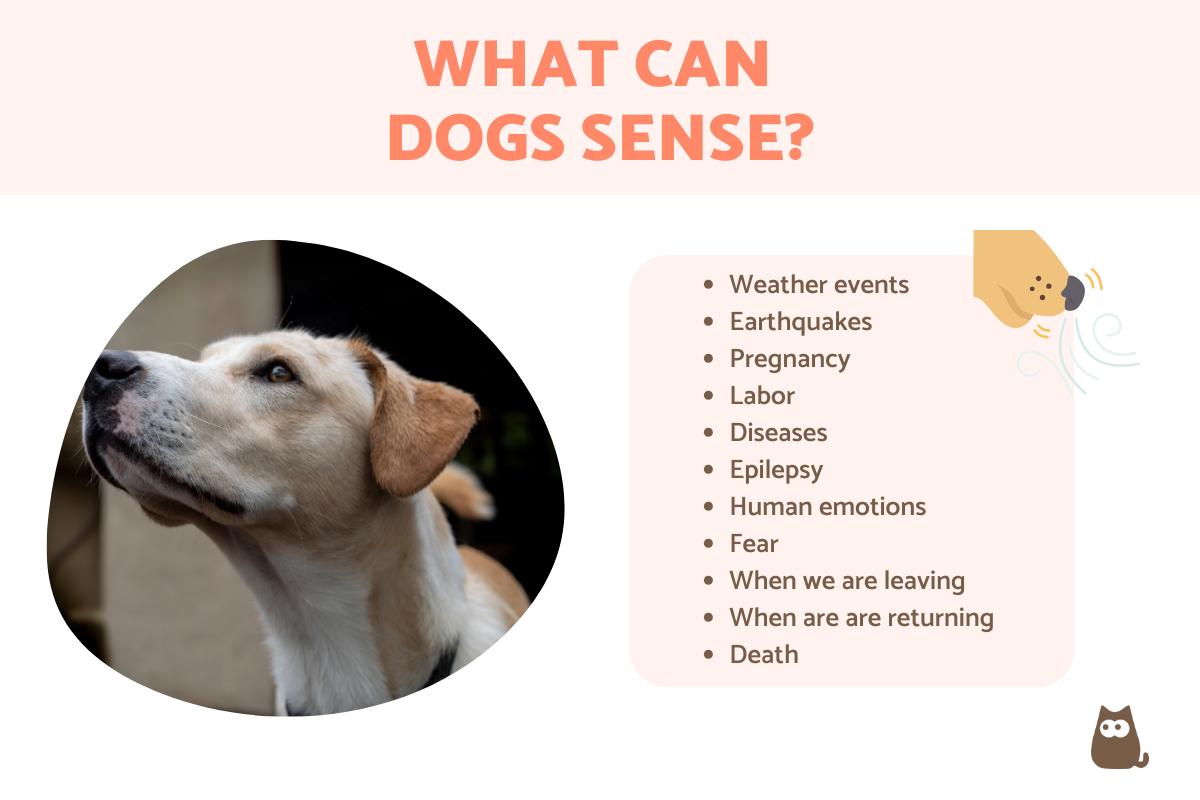What Can Dogs Sense?



See files for Dogs
Many of us give extra-sensory abilities to our dogs, believing they can sense spirits and other paranormal presences. While there is no conclusive scientific evidence this is possible, there is plenty of evidence to explain their incredibly acute sensory abilities. Often we attribute them with special powers because their sensory and perceptive abilities are so amazing to us. The things dogs can sense are related to themselves, their family and their environment at large. They can perceive emotions we don't even know we are experiencing, as well as atmospheric events which haven't yet begun.
At AnimalWised, we ask what can dogs sense? We find out the emotions, diseases, environmental changes and more that dogs can sense or even predict.
- Weather events
- Earthquakes
- Pregnancy
- Labor
- Diseases
- Epilepsy
- Human emotions
- Fear
- When you are going to leave
- When you are going to return
- Death
- Can dogs sense evil?
Weather events
When a storm is approaching, we may be able to hear distant thunder or observe other atmospheric phenomena that alert us to its beginning. Dogs can hear these too and may even be scared by loud bangs of thunder and flashes of lightning. It is also possible that long before we see these atmospheric changes, our dog has reacted accordingly.
As a thunderstorm is forming, various atmospheric changes occur. This includes the ionizing of the air, a phenomenon that produces a metallic scent which we cannot smell. The ability of dogs is different. The number of olfactory receptor neurons they possess means their sense of smell is thousands of times better than our own. Their wild instinct kicks in and they know to shelter and protect themselves before the bad weather arrives.
Earthquakes
An earthquake is another environmental change that dogs can sense much before we do. It is a reason why many of us think they have supernatural ability. Dogs can sense minute seismic changes in the ground which alert them to an ensuing earthquake, even if we have no perception at all. It will have to happen soon before an earthquake occurs, but we might see various behavioral changes in the dog.
Especially if they have experienced an earthquake before, a dog may try to run up to higher ground. They will do so for protection. If they stay in the same place, they may become nervous or reluctant to stay inside the home.

Pregnancy
We have already explained that the incredible sensory ability of dogs means they can sense atmospheric changes. Such perception can also apply to the human body. When a woman becomes pregnant, her body starts to produce different sex hormones such as estrogen and progesterone necessary for fetal development. A dog's sense of smell is so strong, they can perceive these changes.
The dog may not accurately understand the concept of human pregnancy, but they can understand that such changes are important. For this reason, we may see the dog becoming more affectionate or even protective over a pregnant woman.
Labor
Just as a dog can sense a woman is pregnant due to hormonal changes, they may also be able to sense imminent parturition (i.e. the woman going into labor). These scents and signals may go unnoticed by us, but the dog is aware that something is happening.
If they have been around a woman going into labor before, they may be able to associate these changes with the beginning of labor. Again, the dog may become more protective and refuse to separate from their guardian since they want to ensure their well-being.

Diseases
Out of all the things dogs can sense, this is one of the most important to humans. Thanks to their incredible sense of smell, they are able to pick up on cellular or hormonal changes which occur when a disease or other medical health issue has developed.
For example, when a tumor forms that is cancerous, various volatile compounds are generated. These include chemical particles which can be released into the air and which a dog can register thanks to their acute olfactory ability. While there is little scientific evidence to support it, there is anecdotal evidence of people being sniffed by their dog in areas where they later found a cancer had developed.
In the case of diabetes, this is due to changes in the amount of insulin hormones in the body. The dog may be able to smell these changes on our breath. They won't know its significance, but it is possible they could be trained to detect the changes and alert their owner of a need for an insulin injection.
Learn about how this affects dogs the other way around with our article on insulin for dogs with diabetes.
Epilepsy
Another way dogs can be trained to help their owners is for those dog guardians that have epilepsy. When an epileptic fit is about to occur, a dog can sense it in their guardian. They can alert them to this so they can take medication or even alert others for their protection.
According to a study by researchers at Queen's university Belfast, there are also untrained dogs that can predict an epileptic seizure[1]. This is because the dogs sense a volatile organic compound exhaled by their epileptic guardian. It is this natural ability which allows them to be trained, something very useful due to the lack of a technological device which can predict epileptic seizures.
Learn more about what to do if your dog has seizures in our related guide.
Human emotions
You have likely noticed many times that your dog likes to look over to where you are, even if you are not doing anything in particular. This is because we are their point of reference and our well-being influences their own. They monitor us for signs of emotional change, taking note if we are sad, angry, happy, excited or even depressed.
Dogs are social animals. Although they can communicate vocally with other dogs, they rely on body language and facial gestures to communicate with us. In this way, dogs can act accordingly when emotions shift. It is also possible they are able to smell hormones such as oxytocin which can accompany a change in mood.
Essentially, humans can infect our dogs with our mood. If we are sad or depressed, they can respond in a similar way. For this reason, it is common for dogs to lay their head on us, come to our side, lick or hands or carry out other behaviors which are designed to make us feel better.
Fear
Fear is one of the most important emotions for dogs. In the wild, an acute fear response can be the difference between life or death when they encounter danger. When dogs sense fear in us, they respond similarly. When we become scared, we secrete a hormone known as adrenaline which dogs can also sense.
Since dogs need us to be safe, they can become very concerned when they smell our fear. They may look around the environment for something which causes the stimulus. This is an important reason for socialization since they need to be able to detect which stimuli are friendly and which are not.
When you are going to leave
In addition to looking at us for changes in our demeanor or mood, dogs notice our general movements. Dogs are animals of routine and they careful analyze our own to see how it affects them. If they know we are going to feed them first thing in the morning, they can get very excited when we come down to greet them. When we take them for a walk in the evening, they can get upset if we have to change plans for whatever reason.
When you are going to return
As we have explained, dogs register our routine. This helps them to know when we are about to leave, as well as when they expect us to routine. However, dogs can also sense us from a long way away. Their acute senses mean they may be able to hear our car keys or even smell our scent from a long way away. In these cases, it almost appears that the dog is predicting our return.
Death
Finally, dogs can sense death. This may be a surprise to you, but it is also rooted in canine and human physiology. As a normal process in the life of all living beings, certain chemical and biological changes occur in the body before death. While we are unable to detect them, dogs are perfectly abe to do so. Just as dogs smell pheromones, they can smell the metabolic changes which occur when the human organism is dying.
For this reason, it is common to see dogs approach and stay next to a loved one who is about to pass away. It may appear as if they are predicting their death, but they are simply responding to physical changes. However, their emotions are affected and they can become very upset.
Learn more about how dogs are affected by grief with our article on whether dogs miss their owners when they're gone.

Can dogs sense evil?
Many of us have anecdotal tales of a dog reacting negatively to someone and that person turning out to be no good. In this way, they may believe that a dog can sense evil in a person. Evil is a philosophical and cultural concept, rather than a physiological characteristic of human beings. In this way, a dog cannot sense evil.
However, a dog is able to assess their environment and the individuals within it for signs of threat. Even if they may look harmless to us, a dog can sense if someone is releasing adrenaline or giving off subtle facial cues which indicate they are going to do something harmful. In this way, dogs are perfectly capable of assessing whether someone is going to cause harm to someone else.
It is important to remember that dogs are not always correct. Just like us, they may perceive somebody incorrectly. While they can register physical changes, they cannot always determine intentions. For this reason, we cannot assume that someone is evil if our dog reacts negatively to them. However, we can train our dog to perceive threats, one of the reasons some canines make great guard dogs.
Learn about feline perception with our article asking can cats sense our fear?

If you want to read similar articles to What Can Dogs Sense?, we recommend you visit our Facts about the animal kingdom category.
1. Powell, N. A., Ruffell, A., & Arnott, G. (2021). The Untrained Response of Pet Dogs to Human Epileptic Seizures. Animals: an open access journal from MDPI, 11(8), 2267.
https://doi.org/10.3390/ani11082267
- Anderson, J. R., Bucher, B., Chijiiwa, H., Kuroshima, H., Takimoto, A., & Fujita, K. (2017). Third-party social evaluations of humans by monkeys and dogs. Neuroscience and biobehavioral reviews, 82, 95–109.
https://doi.org/10.1016/j.neubiorev.2017.01.003








